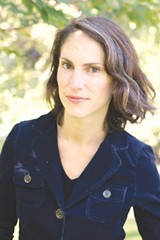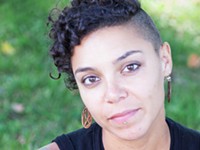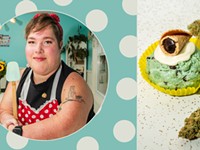[
{
"name": "500x250 Ad",
"insertPoint": "5",
"component": "15667920",
"parentWrapperClass": "",
"requiredCountToDisplay": "1"
}
]
In her debut novel, "The Wonder Garden," author Lauren Acampora's imagination plumbs the messy, complicated inner lives of the residents of an affluent New England suburb. Through the book's 13 short stories, Acampora deftly interweaves the lives of many individuals as they navigate shifts in relationships and the place of their personal hopes and dreams within the wider community. The rich storytelling is strange and beautiful, and much of its power comes from the way we perceive individuals anew through the fresh eyes of different characters as the stories progress and tangle.
This week, Writers & Books will bring Acampora to Rochester for seminars, readings, and signings, as part of its annual Debut Novel Series. Visit wab.org for more details. City Newspaper spoke with Acampora in advance of her visit. An edited version of that conversation follows.
City: You grew up in a New England suburb. How was your experience similar to or different from your descriptions of Old Cranbury? Are some of these characters and scenarios drawn from observations?
Lauren Acampora: Everything I write stems from some observation that I've made at some point. Imagination plays a big role, too. Most of it was invented but, of course, the seed of anything I write does come from something.
The town where I grew up is Darien, Connecticut. Old Cranbury is not based directly on Darien, but is kind of a hybrid of towns in that area. I borrowed characteristics from Darien, from New Canaan, and Westport, and also Westchester County, which is where I live now, in New York State.
The seed of inspiration for "Swarm," about an artist whose neighbors commission him to do the artwork of a lifetime, came from Southport, Connecticut, which is a very wealthy oceanfront community. There is a very wealthy family of art collectors who had an Anselm Kiefer sculpture installed on their front lawn, in front of a very grand Georgian colonial house. It was a very avant-garde looking sculpture, with a lot of concrete and rebar, and the neighbors did not agree with the aesthetic tastes of this family. They thought the piece was an eyesore and did not belong on any front lawn in their community, so they sued the family, and the town won. The couple had to remove the piece, and they ultimately donated it to a museum.
That story always stayed with me: the tension between individual rights in a community, and self-expression versus community standard. Who sets that standard, and where is the line drawn between individuality and conformity? I imagine my characters going through something similar.
Many of your characters seem to have a lot of power and privilege, and yet they're constantly brushing up against restrictions. There's an irony in this.
Yeah, that's true. It seems that in a sense, the more privileged a community, the more restrictions come with that, in terms of the way people are expected to express themselves, the way they're expected to behave. There's a set of mores that people find themselves within, and it becomes increasingly more difficult to be idiosyncratic, or eccentric in any way.
I do firmly believe that people are much more eccentric, deep down, than they allow themselves to appear, for fear of being ridiculed or ostracized. It's something I experience in my own environment. Every so often, though, you'll find a house where the owner is making a statement through their property. To me, that's symbolic of repressed creativity aching to get out. People need to have an outlet. Particularly, in these privileged environments, effort is being put toward work in an office environment, toward housekeeping — sort of uncreative pursuits. People start to feel a little penned in, a little frustrated. At least my characters do. That's part of where mid-life crises come from in these privileged echelons.
The parents' obsession with the past, and Old Cranbury's history in "The Virginals" reminded me of that article on Vox written by Sarah Chrisman, who tries to live an authentic Victorian life with her partner.
Yeah, somebody sent me that article! I loved reading it; I would love to write about these people. It really echoed that exact same drive that I found in my colonial people.
Chrisman received a lot of criticism, calling her perspective of the past a privileged one.
It's been really vitriolic. I sympathize with the drive to bring back or regain these dated values. Certainly, it's far from perfect, and a lot of people have pointed out that back then, people were slaves. That's not something we should try to recreate. But they're picking and choosing the values that they want to bring into their life, and I think that's noble. It's also doomed. Those are my favorite characters: the noble, doomed characters. It's absurd but it's also quite endearing. I love people who are quixotic.
Some of your characters' idiosyncrasies are easier to relate to, but others have a certain cruelty or madness in their execution of what they think is the right thing. In the story "Sentry," Helen tries to teach Avis's mother a lesson, and she herself behaves criminally. Can you speak about creating that character?
I often talk about my process as trying to capture a bad thought that I have myself. Let's say I'm out at a restaurant, and I see some parents mistreating their child. And I think, "I could do a better job." I think we all have thoughts like that, when we disapprove internally of something we see. And then we push down that thought.
But what I like to do is take out that thought, and try to examine it, and also imagine, what if there was a character who had a thought like this, and then continued down that road with it? I find a lot of stories doing that kind of thing. What sort of character would do something like that, what would drive her to do something most people would find extreme?
The answer that I came up with first was her personality. She has a certain amount of arrogance and a lack of self-insight. She's unaware of her own flaws as a parent, and what role she may have played in her own son's downward spiral. Maybe this is her attempt to do better, to start fresh. And of course, it's not her child to start fresh with. She's not self-aware, and struggling with pretty deep pain about her own family life. I don't know how sympathetic she ended up being ... that story, more than any other in the book is inspired by a Flannery O'Connor type. I think of her as pure O'Connor. She'd fit in with that group.
Speaking of...
Latest in Culture
More by Rebecca Rafferty
-

Beyond folklore
Apr 4, 2024 -

Partnership perks: Public Provisions @ Flour City Bread
Feb 24, 2024 -

Raison d’Art
Feb 19, 2024 - More »






